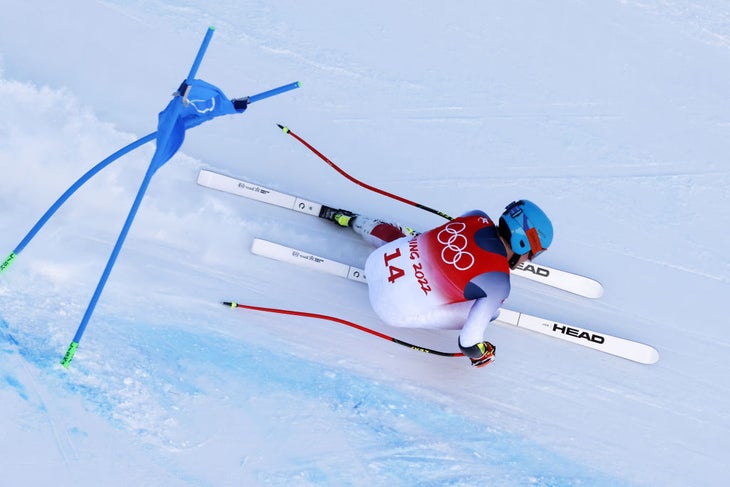Products You May Like
Receive $50 off an eligible $100 purchase at the Outside Shop, where you’ll find gear for all your adventures outdoors.
Sign up for Outside+ today.
Tuesday’s Olympic men’s super-G at the Yanqing National Alpine Center was emotional in more ways than one.
Austria’s Mattias Mayer became the first male alpine skier to win Olympic gold in three successive games. Team USA’s Ryan Cochran-Siegle earned his first Olympic medal after finishing just four-hundredths of a second behind Mayer to take silver almost 50 years to the day after his mother, Barbara Ann Cochran, took slalom gold in the 1972 Sapporo Games. Then Norway’s Aleksander Aamodt Kilde also earned his first Olympic medal in bronze, a year after suffering a knee injury that kept him away from an Overall crystal globe on the 2021 World Cup Tour.
“Now, in this moment, I’m not thinking about history,” Mayer commented in a post-race press conference in Yanqing. “It was a great race, and it was a very close race. I mean, I was just four hundredths in front of Ryan. And I saw Aleks run from the start and he did extremely well, so I knew I had to go all in.”
“It’s margins in this sport,” added Kilde. “It’s the athlete’s performance that counts, and it’s quite incredible what Mattias and Ryan accomplished today, so hats off to them.”
Related: The winning philosophy that made the Attacking Vikings a force to be reckoned with
Cochran-Siegle skied what looked like a flawless run to your average viewer, and as he slid through the finish and saw his time on the leaderboard, a moment of elation was immediately met with a tentative comment—“I hope it holds”—a classic statement from the Vermonter, never willing to get too far ahead of himself.

He hails from a family of Olympians, known affectionately in the sport as “the Skiing Cochrans.” Not only is his mother a gold medalist, but his aunts Marilyn and Lindy, as well as his uncle Bob, are storied Olympic athletes. Jimmy Cochran, Ryan’s cousin, skied in the Olympics in 2006 and 2010. Cousins Jess Kelley, Tim Kelley, and Robby Kelley are all ex-U.S. Ski Team members.
Related: Competing Among Ski Racing’s Elite is A Family Tradition for Ryan Cochran-Siegle
The ever-humble 29-year-old is well aware of his family history, but he’s never let it get to his head. He is known by his teammates as one of the most dedicated men in the sport, the kind of guy who will spend hours on end analyzing video, perfecting the smallest aspects of his technique in order to produce his best skiing possible. He’s been through the wringer with injuries, surgeries, and recoveries. In 2021, Cochran-Siegle was leading the Overall downhill standings when a crash in Kitzbühel broke a vertebra in his neck and kept him away from contending for the crystal globe in men’s downhill.
He knows in ski racing, it’s anybody’s ballgame on any given day, especially in speed races. Even guys from the back of the pack could come from behind and post the run of their life, knocking early starters out of podium position. Yet it’s easy for fans and media to get ahead of themselves in the finish as bib numbers in the start list increase and the number of remaining racers decreases.
Midway through the race, NBC reporters pulled Cochran-Siegle aside for an interview. The American made his best effort to hold back his emotions, knowing the race was not yet over.
“Your mom won a gold medal 50 years ago, looks like the family tree is going to have another medal,” commented the reporter. “How impactful is that to you given the history of your family in this sport?”
That moment sent Cochran-Siegle over the edge. “The race is not yet over, but I really hope I stay in there,” he said as he fought back tears. “Getting an Olympic medal is definitely a dream. 365 days ago, I was walking out of a [hospital] bed from neck surgery. As an athlete, you’re always charging, you’re always trying to get better, and sometimes you can use it as fuel…”
He trailed off, took a moment to regain his composure, and added “but at the end of the day you can just never give up on yourself.”
Soon after, Cochran-Siegle connected with his mother, Barbara, via FaceTime in the finish area. They celebrated the moment together, although miles apart. “She’s still better than me,” he joked.
“I’m so, so proud,” Barbara Cochran said of the moment. “I really think that for our family, that it wasn’t about the results, but it was about enjoying the competition and doing what we could and trying to get better. And I think that’s what Ryan did, too. He always wanted to do his best and when you do that, it works out.”
For Cochran-Siegle, Tuesday’s super-G will go down in family history as “the best second place of his life”—an Olympic moment for all of the Skiing Cochrans to remember.
